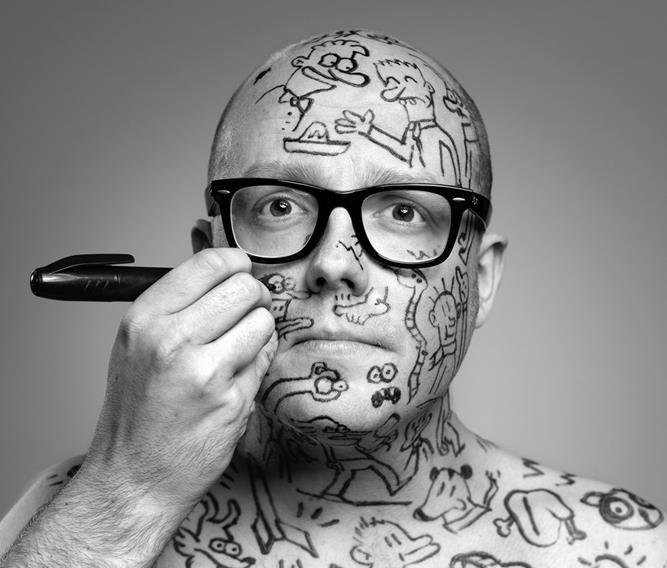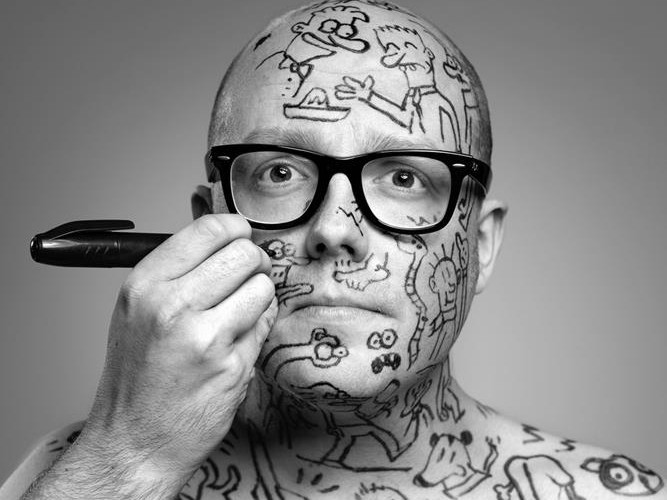
My name is Lectrr. I’m a professional cartoonist from Belgium, working for ‘De Standaard’, a newspaper with a strong tradition in quality journalism. I’ve been working as a cartoonist for over a decade now and I’ve seen the business change a lot. For better or for worse is something only the future will tell.
Most of the changes have happened slowly and over the years. Budgets for quality journalism and cartoons have been sinking since the day I’ve started working in this field. Media companies have become multi-media brands, and so forth. But the most abrupt change for me happened on January 7th this year. The attacks on Charlie Hebdo.
Before Charlie Hebdo, cartoonist were not to be taken seriously. We were men and women that drew comic book like figurines with silly noses. Things that made people laugh, sometimes think, but mostly help to put things in perspective. Funny, sometimes a bit more than that, but always somewhere on the edge of what newspapers were about. Cartoonists were outsiders, nobody knew how we looked like. We hardly got interviews, never appeared on TV.
But then the attacks took place. In one blink of an eye, the entire world turned to the cartoonists and instead of seeing men drawing silly figurines with big noses, they saw freedom fighters. Something we never intended to be, something most of us aren’t.
We were interviewed on worldwide news channels, invited for debates on live TV, VIP guests at media conferences. When a cartoon exposition opened a prime ministers would even attend, while before we hardly got normal visitors. The outsiders were at the center of attention. But our message never changed, it was only the perception of what we did that changed.
I found that to be dangerous. It is our task, as cartoonists, not to be celebrities. It is our task to be annoying, out of the context, out of the spotlight. As eternal opposition for the ones in power, asking difficult questions. But politicians embraced us! They were all Charlie. Suddenly everybody was supportive of the freedom of speech-idea, even the ones who make the laws or machinations that diminish this freedom of speech.
Personally, I backed out. I refused television interviews and media appearances. I found it to be more powerful when I spoke on these current events by making cartoons, not comments on TV. I’m a lousy TV guest but a great cartoonist. My place is behind the drawing desk, not in the spotlights. While a lot of cartoonists worldwide, all Charlie and pro-freedom of speech, became more careful in their cartoons I never found the necessity to give in. I didn’t see the need to draw Muhammad and still be critical about religion and violence, and found my urge to make cartoons very strong the weeks after the attacks. I felt that my pen did become as sharp and powerful as a sword. And a lot of readers found so too: the cartoons I made in response went global. And got the attention of Islamic extremists.
The number of hate mail a critical cartoonist receives is getting more and more substantial over the years. Back in the seventies it was difficult to send a hate letter to a cartoonist: you had to write a letter manually and mail it by post. You had hours to change your mind before the bad letter would leave. But nowadays, with the internet one can literally get mad and reach the person you’re mad at within seconds.
No time to think or to change your mind about something. Just instant hate. By getting a lot of those over the years, cartoonist tend to get numbed. I never respond to or even read hate mail. Sometimes we joke among cartoonists about the bad spelling in hate mail. One morning I received a death threat from an extremist. Didn’t give much attention to it, really. Completely numbed by hate mail.
I can’t go into detail but the threat was serious enough and my family and I lived in fear for weeks. But even fear wears out. I think that’s exactly what happened to Charlie Hebdo: after a while you grow used to the threat. Next time a death threat comes along, and I’m sure it’s not a matter of ‘if’ but ‘when’, it’ll have less impact on my life and that of my peers. That’s the big danger in things: we grow indifferent of the danger, in the same way we grow indifferent of freedom of speech.
That’s the biggest point I would like to make. Islamic terrorism isn’t the biggest threat to freedom of speech, we are. We’ve been taking our freedom for granted. The danger no longer lies in the idea that someone would want to take it away from us, someone like a dictator or a terrorist mastermind, but within our own behavior.
Nowadays we’re all the media. Information is no longer dominated by newspapers or TV channels. Everybody with a smartphone or tablet or computer has become a media producer. We produce content at an enormous rate: cat videos, instagram pictures of our cappuccinos, selfies with new sneakers, yay! But what we don’t realize is that we have a responsibility as a medium. By producing these enormous amounts of meaningless content, we’re creating an enormous internet diarrhea of images and ideas hardly worth our concentration. True, interesting messages of social importance get swamped in that internet diarrhea: good investigational journalism no longer weighs up to cat videos. Newspapers start to adopt the ’10 ways to’-journalism. Cartoons no longer find their readership to make people laugh and think. Everybody has a responsibility to be critical, but it’s more fun to get a lot of likes. Jihadists don’t need to kill advocates of freedom of speech, we’re burying them ourselves in cat videos and endless lists on how to improve your sex life. Just because we are growing indifferent. Indifference is worse than being forced out of your freedom of speech. When you’re forced out, you at least still have an opinion of your own. A thought. When you’ve grown indifferent, you don’t. Not. Even. A. Thought.
The world isn’t better off with 10 million people saying ‘je suis Charlie’, we need the few that will think for themselves. Now more than ever.
Since 7/1 I’m not afraid of Islamic terrorism, but I’m scared shitless about indifference.
About the author:

Lectrr is a Belgian cartoonist, currently working for De Standaard-newspaper.

